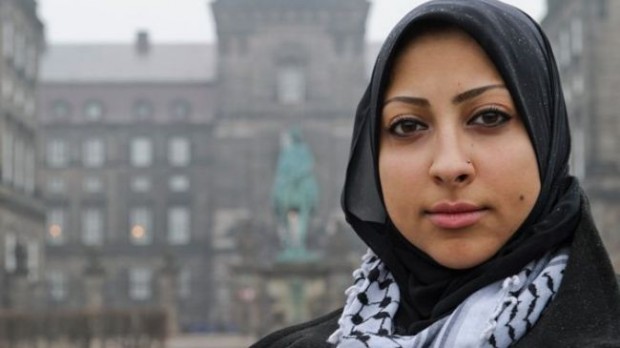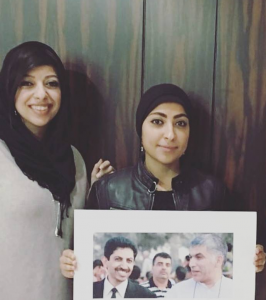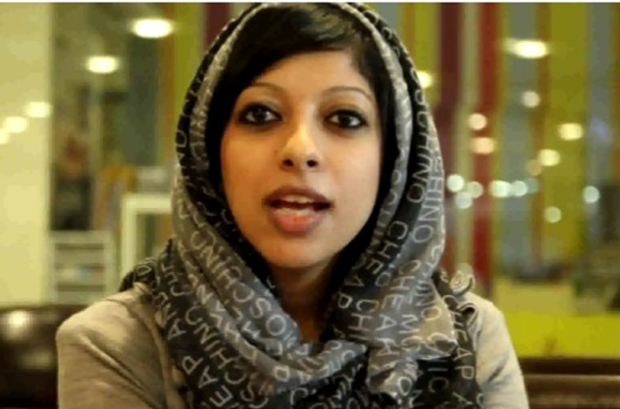Index relies entirely on the support of donors and readers to do its work.
Help us keep amplifying censored voices today.

As a human rights defender, I, Maryam Al-Khawaja, Director of Advocacy at the Gulf Center for Human Rights, have decided to boycott my court hearing on the 1 December 2014. During this hearing I am due to be sentenced on trumped up charges of assaulting two policewomen at the Bahrain International Airport. (Update: Al-Khawaja was sentenced to one year imprisonment on 1 December)
The decision to boycott the court was reached based on several grounds:
It has become evidently clear that it is not possible to have a fair and independent trial in Bahraini courts as they stand. The judicial system in Bahrain is highly flawed, and is overrun with egregious human rights violations which usually start during the arrest, and continue throughout what is supposed to be a legal process. I was personally subjected to numerous human rights violations since the moment of arriving in Bahrain and until I was able to leave the country as can be read in my testimony here.
There are medical reports about the injuries I sustained during the assault I was subjected to, for which I continue to need physiotherapy. My case was sped up, and quickly turned for sentencing with complete disregard to legal procedures.
The presiding judge, Mohammed Ali Alkhalifa, in the case brought against me is a member of the ruling family, and has been himself, as well as members of his family, identified previously during my advocacy campaigns as implicated in human rights violations. This makes his presiding over the case a clear case of conflict of interest given the personal grievances he may have against me. This judge in particular, it is important to note, has been involved in the sentencing of numerous human rights defenders including Nabeel Rajab and Naji Fateel in unfair trials.
During my imprisonment I met with the SIU, headed by Nawaf Hamza, to submit a complaint against the three policewomen and the first lieutenant who assaulted me at the airport. The prosecutor, Mohammed Al-Hazaa, rewrote my statement in his own words, attempting to implicate me in violations, and refused to correct what he had misquoted. This resulted in my refusal to sign the papers and filing of a complaint against the prosecutor. One day before the sentencing, namely on the 30th of November 2014, and due to almost daily follow up by my lawyer, the public prosecution notified him that the complaint case had been revoked. Despite my complaint about the assault since the beginning of my arrest, it was only one day before the sentencing that my lawyer was finally able to get a statement from the public prosecution that my complaint case had been revoked, at a time when the trumped up assault charges against myself were speedily processed and turned for sentencing.
During the interrogation I was subjected to, I was refused access to my lawyer by the prosecutor dealing with my case. During my imprisonment my lawyer was not given any visits, nor was the Danish embassy. The way that the public prosecution deals with politically motivated cases is it uses all aspects of the government to provide impunity for the perpetrators of violations.
Based on the reasons stated above, I find any and all cooperation with the court or attendance of the hearings by myself as a problematic legitimisation of an unfair and biased court. Therefore I have decided to boycott the hearings, and have asked my lawyer to do the same.
It is important to note here, if I, as a human rights defender, whose case receives international media and diplomatic attention is handled in this way; it is gravely concerning how cases not receiving attention are handled by the authorities in Bahrain.
Maryam Al-Khawaja
Director of Advocacy
Gulf Center for Human Rights
30th November 2014
Nine human rights organisations called on the British government on Friday to speak out publicly in the case of activists currently being detained in Bahrain. Prominent human rights defenders Nabeel Rajab, Zainab Al-Khawaja and Ghada Jamsheer have all been arrested and face lengthy prison sentences in Bahrain for cases of peaceful expression.
This echoes the message from Maryam Al-Khawaja, a prominent Bahraini activist and co-director of the Gulf Centre for Human Rights, earlier this week.
You can imprison a human rights defender, but you can’t stop the human rights cause, Al-Khawaja told a packed press conference in London on Wednesday, organised by Index on Censorship and the Bahrain Institute for Rights and Democracy (BIRD).
She urged UK authorities to speak out about rights abuses in her country, which she said is being run like a business by the ruling Al-Khalifa family. This comes after the arrest of her colleague, 2012 Index advocacy award-winner Bahrain Centre for Human Rights (BCHR) president Nabeel Rajab. He is facing charges of insulting government institutions on Twitter. His trail opens on 19 October.
Also on Wednesday, her sister Zainab Al-Khawaja, who is 8 months pregnant, was sentenced to seven days’ detention for publicly insulting King Hamad bin Isa Al-Khalifa by ripping up a picture of him in court. She was in court over charges connected to her previous human rights campaigning.
Al-Khawaja, a dual Danish and Bahraini citizen, was herself recently released on bail after being arrested at Bahrain International Airport when trying to enter the country to see her father. She said: “I was stopped at the airport where I was told falsely that my citizenship had been revoked.”
She was then assaulted by police at the airport, and is still recovering from a torn muscle in her shoulder as a result. The police officer who assaulted her later filled charges against Al-Khawaja, presenting a scratched finger as medical evidence.
Al-Khawaja spoke of her time in Isa Town women’s prison, where she spent 19 days; she described poor sanitation and said there were no nurses or doctors available at night and it took 45 minutes for ambulances to reach the facility.
Al-Khawaja’s father, Abdulhadi Al-Khawaja, the founder of 2012 Index award winner BCHR, is serving a life sentence after playing a prominent role in the country’s 2011 pro-democracy protests.
Al Khawaja described how changes could be implemented in Bahrain, saying there is a need for pressure from countries such as the UK and US, who have the capability to make sure the government respect human rights.
“Reform can be implemented and enforced by accountability,” she said.
Nominations are now open for the Index Freedom of Expression Awards 2015. Put forward your free expression heroes here.
Please ask your MP to support the campaign by writing to the Foreign and Commonwealth Office. (This web app will take you to the website of the Bahrain Institute of Rights and Democracy)
Videos via Truthloader

Zainab and Maryam Al-Khawaja
Seven years ago this month, renowned human rights defender and former Index award winner Abdulhadi Al-Khawaja was dragged from his home in Bahrain, tortured, tried in a military court, and sentenced to life in prison for his peaceful role in 2011 protests. Today, 5 April, on Al-Khawaja’s 57th birthday, the undersigned human rights organisations call for his immediate release and for all human rights defenders jailed in Bahrain to be freed.
On Monday 9 April, human rights organisations, friends, and supporters will join two of Al-Khawaja’s daughters, Zainab and Maryam Al-Khawaja, for two events in London:
Protest: Bahraini Embassy, 1pm
Call on the Bahraini Government to release Abdulhadi Al-Khawaja
30 Belgrave Square, Knightsbridge, London SW1X 8QB
Front Line Defenders has been organising monthly protests at the Embassy since January 2018
Conversation with Zainab and Maryam Al-Khawaja, 6:30pm
Hosted by Front Line Defenders and ARTICLE 19
Free Word Centre, 60 Farringdon Road, London, EC1R 3GA
Abdulhadi Al–Khawaja is an internationally-known Bahraini-Danish human rights defender who is the founder and former President of the Bahrain Centre for Human Rights (BCHR), established in 2002, and a Founding Director of the Gulf Centre for Human Rights (GCHR), established in 2011. He was Middle East and North Africa Protection Coordinator for Front Line Defenders until February 2011, when he resigned during the popular movement in Bahrain.
He was violently arrested on 9 April 2011 and charged in connection with his peaceful human rights activities. This was followed by brutal torture, resulting in a broken jaw and requiring several operations, then finally by an unfair trial grossly violating international standards for fair trials and due process. He undertook a number of hunger strikes to protest torture and poor prison conditions.
Al-Khawaja is one of a group of 13 human rights defenders and political activists (the Bahrain 13) sentenced to lengthy prison terms solely for exercising their right to freedom of expression, association and peaceful assembly. Following a grossly unfair trial, Al-Khawaja was sentenced by the National Safety court (a military court) on 22 June 2012 to life in prison, along with seven other members of the Bahrain 13. As the sentence was being pronounced, Al-Khawaja raised his fist saying: “We will continue on the path of peaceful resistance.”
The current situation in Bahrain is dire. The vast majority of human rights defenders are in jail, in exile, under travel ban, or enduring severe threats and intimidation as a result of their peaceful work. Dozens have been abused and tortured. International NGOs and journalists have been prevented from visiting Bahrain to document the government’s ongoing human rights abuses.
At the same time, Bahrain continues to host events such as the Formula One 2018 Gulf Air Bahrain Grand Prix from 06 to 08 April, during which time any protests are sure to be met with reprisals.
Just two days ahead of the Formula One, on 04 April 2018 at 02am, Lars Aslan Rasmussen, a Danish Member of Parliament, and Brian Dooley, GCHR Advisory Board member, arrived in Bahrain in an attempt to visit Al-Khawaja in prison. They were refused entry on the basis that they posed a “security risk” and deported.
We the undersigned call on the authorities in Bahrain to:
Signed by:
Americans for Democracy & Human Rights in Bahrain (ADHRB)
Arabic Network for Human Rights Information (ANHRI)
Bahrain Center for Human Rights (BCHR)
Bahrain Institute for Rights and Democracy (BIRD)
English PEN
European Center for Democracy and Human Rights (ECDHR)
FIDH, under the Observatory for the Protection of Human Rights Defenders
Front Line Defenders
Gulf Centre for Human Rights (GCHR)
IFEX
Index on Censorship
PEN International
World Organisation Against Torture (OMCT), under the Observatory for the Protection of Human Rights Defenders

Index on Censorship calls for the immediate release of human rights activist Zainab Al-Khawaja, who was arrested on Monday 14 March 2016 with her one-year-old son Abdulhadi.
“Zainab Al-Khawaja is facing retaliation for exercising her right to freedom of expression,” said Index’s senior advocacy officer Melody Patry. “Bahraini authorities have been harassing her and her family for years and this arrest — based on absurd charges — further shows Bahrain’s determination to silence its critics.”
Zainab Al-Khawaja is a prominent human rights activist and is currently facing a prison sentence of three years and one month linked to various court cases against her, including for tearing up a photograph of the king and insulting a police officer.
The conditions of Al-Khawaja’s detention at the Isa Town women’s prison are concerning. There is a risk of contracting Hepatitis C in the section of the prison she and Abdulhadi are being held; and she was told to make sure she doesn’t give her baby any water in the prison that is not bottled. Since her incarceration earlier this week, Al-Khawaja has had muscle spasms in her back due to the stress of the arrest and from carrying her baby and bags. She was taken to the hospital on Thursday 17 March, given an injection and a back brace she has wear at all times, her sister, Maryam Al-Khawaja reported.
The Al-Khawaja family have been heavily involved in Bahrain’s pro-democracy movement, and have been continuously targeted by authorities.
Al-Khawaja’s father, Abdulhadi Al-Khawaja, is the head of the 2012 Index Award-winning Bahrain Center for Human Rights and has been serving a life sentence since 2011 for the role he played in the country’s ongoing protest movement which started that year.